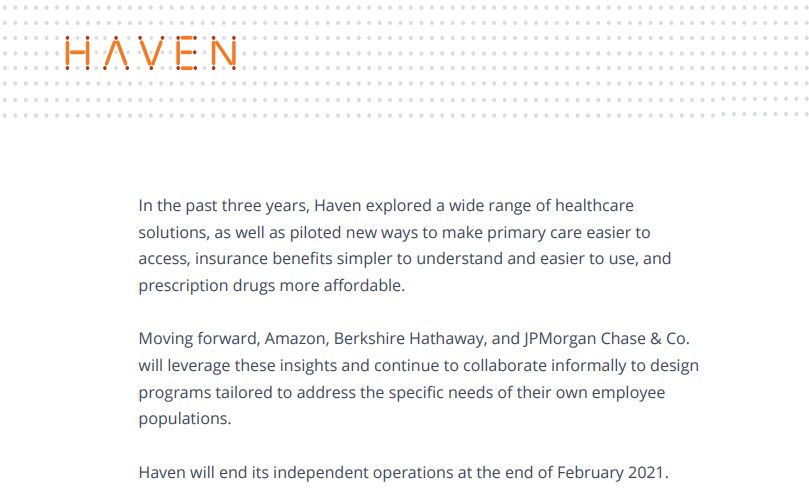
There’s a frightening question we have to ask about our healthcare system: can we actually stem the cost of healthcare in this country?
The government has been trying to do that for the past 12 years or so, and has mostly failed. In 2021, employers are still noticing insurance rates rise another 10 percent or so. When it comes to insurance, family premiums have gone up 54 percent since 2009, which is when the Affordable Care Act was passed. Since 2014, prescription drug prices have increased by 33 percent, despite actions taken by the Trump administration to curb them.
If government intervention doesn’t have any meaningful impact, the only other option would be the private sector. They too, though, seemingly aren’t going to be able to fix these problems, if the recent shutdown of Haven is any indication.
Haven, of course, was the healthcare company that emerged from a joint venture between JP Morgan Chase, Amazon and Berkshire Hathaway in 2018, to much fanfare. The goal, the company said, was to use technology to make healthcare simpler, higher-quality and lower cost.
“The ballooning costs of healthcare act as a hungry tapeworm on the American economy. Our group does not come to this problem with answers. But we also do not accept it as inevitable. Rather, we share the belief that putting our collective resources behind the country’s best talent can, in time, check the rise in health costs while concurrently enhancing patient satisfaction and outcomes,” Berkshire Hathaway Chairman and CEO, Warren Buffett, said in the original announcement.
Three years later, just as abruptly as Haven arrived, it quietly decided to shut down: in an announcement on its homepage earlier this month, the company revealed that it would be closing its doors at the end of February. No further explanation as to why this decision was made, or why now, was given. When reached for comment, this is what Brooke Thurston, a spokesperson for Haven, told VatorNews:
When reached for comment, this is what Brooke Thurston, a spokesperson for Haven, told VatorNews:
“The Haven team made good progress exploring a wide range of healthcare solutions, as well as piloting new ways to make primary care easier to access, insurance benefits simpler to understand and easier to use, and prescription drugs more affordable,” she said.
“Moving forward, Amazon, Berkshire Hathaway, and JPMorgan Chase will leverage these insights and continue to collaborate informally to design programs tailored to address the specific needs of our individual employee populations and locations.”
So, what exactly happened? Why did Haven only last three years and seemingly accomplish none of what it set out to do? The answer might simply be that the American healthcare system is too big, and too entrenched, for even a combination of some of the biggest companies in the world to fix it.
Taking on the healthcare system
Just how powerful are Amazon, JP Morgan and Berkshire Hathaway? In 2019, the three companies had a combined $650.7 billion in revenue. Yet, even with those resources behind them, they still did not have enough market power to change the healthcare system in any meaningful way, said Sophia Tripoli, Director of Health Care Innovations at Families USA, a national, nonpartisan consumer healthcare advocacy organization.
“While Haven captured the attention of headlines because of the big name companies coming together to solve the US healthcare cost crisis, it is not overly surprising that the project has officially shut down,” she explained. “One of the biggest issues running against any market disruptor, such as Haven, is the amount of relative market they have to influence the negotiation of healthcare prices with providers,”
She noted that the combined employee base of the three companies is just 1.2 million, and that “does not give them nearly enough market power when negotiating prices with hospitals and other healthcare providers.”
In fact, in order for an employer group to really make headway in a local market, they’d need to have at least 50 percent of that market, something Tripoli believes is not even possible now, thanks to unchecked consolidation in the healthcare industry. So, even if a powerful company like Haven can’t get the amount of traction it would need to disrupt the system.
“Consolidation is the most significant driver of the healthcare cost crisis that the U.S. faces. The fact that another effort to disrupt the healthcare system and contain costs has failed, just underscores the fact that US healthcare markets are not working for America’s families or their employers,” she told me.
Larry Levitt, executive vice president for policy at KFF, a nonprofit organization focusing on national health issues, agreed with Tripoli about the lack of power of employer coalitions to make meaningful changes to the healthcare system.
“Haven didn’t seem to accomplish a whole lot, so its demise isn’t all that consequential in any tangible way. What’s most interesting here is that yet another over-hyped effort to disrupt the healthcare system has failed,” he said.
“There are employers purchasing coalitions that are doing important nitty gritty work to nudge the health system towards lower costs and better quality. But, these coalitions generally lack enough market leverage to be transformative.”
Levitt, however, did offer a few suggestions about how a company like Haven could have lowered costs, including excluding high-cost doctors and hospitals from their insurance networks. The reason they don’t do that, though, is it would, ironically, anger their employees, as those kinds of “narrow insurance networks piss employees off, including executives.”
The other way they could lower costs, he said, is by directing their focus outward, instead of inward.
“Employers pay a big chunk of the nation’s healthcare bills, and could be an influential lobby for lower costs if they chose to use their political capital that way. Historically, employers have generally used their political influence on issues affecting their specific companies, not on pushing back hard against the healthcare industry on costs.”
The cost of healthcare versus the cost of poor health
There’s also the possibility that the reason behind Haven’s failure to live up its big promises lies with the priorities of the companies themselves; that they were focusing too much on cost savings rather than the health of their employees.
That’s what Esther Dyson, angel investor and Executive Founder at Wellville, a national nonprofit project to demonstrate the value of investing in health, believes.
“When they first started, Haven really should have focused on improving the long term health of their employees, not saving money. Not providing the same old care more cost effectively, but actually keeping their employees healthy and focusing much more on lifestyle. Not fixing problems but creating resilience,” she said.
“I really got the sense that, despite all the nice rhetoric, they were more focused on, ‘How can we get lower cost healthcare?’ rather than, ‘How can we make our employees healthier?’ And those are two very different goals.”
The cost of healthcare is less of a problem than the cost of poor health, Dyson said. That’s the real problem and it affects productivity and retention, which, in turn, hurt the business in the long-run. She believes that was always going to be an issue with a company like Amazon, which has a board and quarterly returns to worry about, and therefore isn’t going to put in the years it would take to see those returns on its employees.
“It says to me that they were focused on short-term, financial spending, rather than investing long-term in keeping their workers healthier. They could afford to do this, a lot of smaller companies can’t. If I’m a small company I don’t have an impact on my community, so they need to work together. You need to think long term and you need to look at it as an investment, not as spending. They still were looking at it as spending,” she explained.
“You need a company that doesn’t have a board that’s focused on one year returns, and that’s the challenge of our culture. We’re very short-term focused.”
Amazon healthcare initiatives
Ultimately, nobody I spoke to seemed all that surprised that Haven shut down, nor did they think it would have a material impact on the healthcare system.
It certainly won’t have any impact on Amazon, which has made made numerous forays into the healthcare space over the past few years, including buying online pharmacy PillPack for over $700 million in 2018, launching its own line of over the counter drugs, and then debuting its own pharmacy delivery service last year.
In 2020 alone, Amazon began offering a new family care benefit to its 650,000 full and part-time Amazon and Whole Foods Market employees through Care.com; it announced a healthcare pilot with primary care service provider Crossover Health to establish local, convenient health centers near Amazon fulfillment centers and operations facilities; the company unveiled a new wearable wristband called Amazon Halo, along with the Amazon Halo app, which uses multiple sensors, including an accelerometer, a temperature sensor, and a heart rate monitor, to monitor activity, sleep, body fat and voice; and Amazon expanded Amazon Care, its virtual health clinic for its employees that it launched in late 2019, to all of its employees in the state of Washington, not just those in Seattle.
These initiatives lack the splashiness of something like Haven, and they also lack the same scope: rather than trying to take on the healthcare system, the goal now seems to be to focus more on how it can expand access to care and benefits to its employees. They are smaller scale and, therefore, perhaps more doable than the goals set out by Haven.
In the end, if a company as big as Amazon, combined with the strength of JP Morgan and Berkshire Hathaway, can’t move the needle on reducing prices or creating transparency, then what hope does anyone else have?
VatorNews reached out to Amazon and Berkshire Hathaway for comment
(Image source: davidjpfisher.com)





















